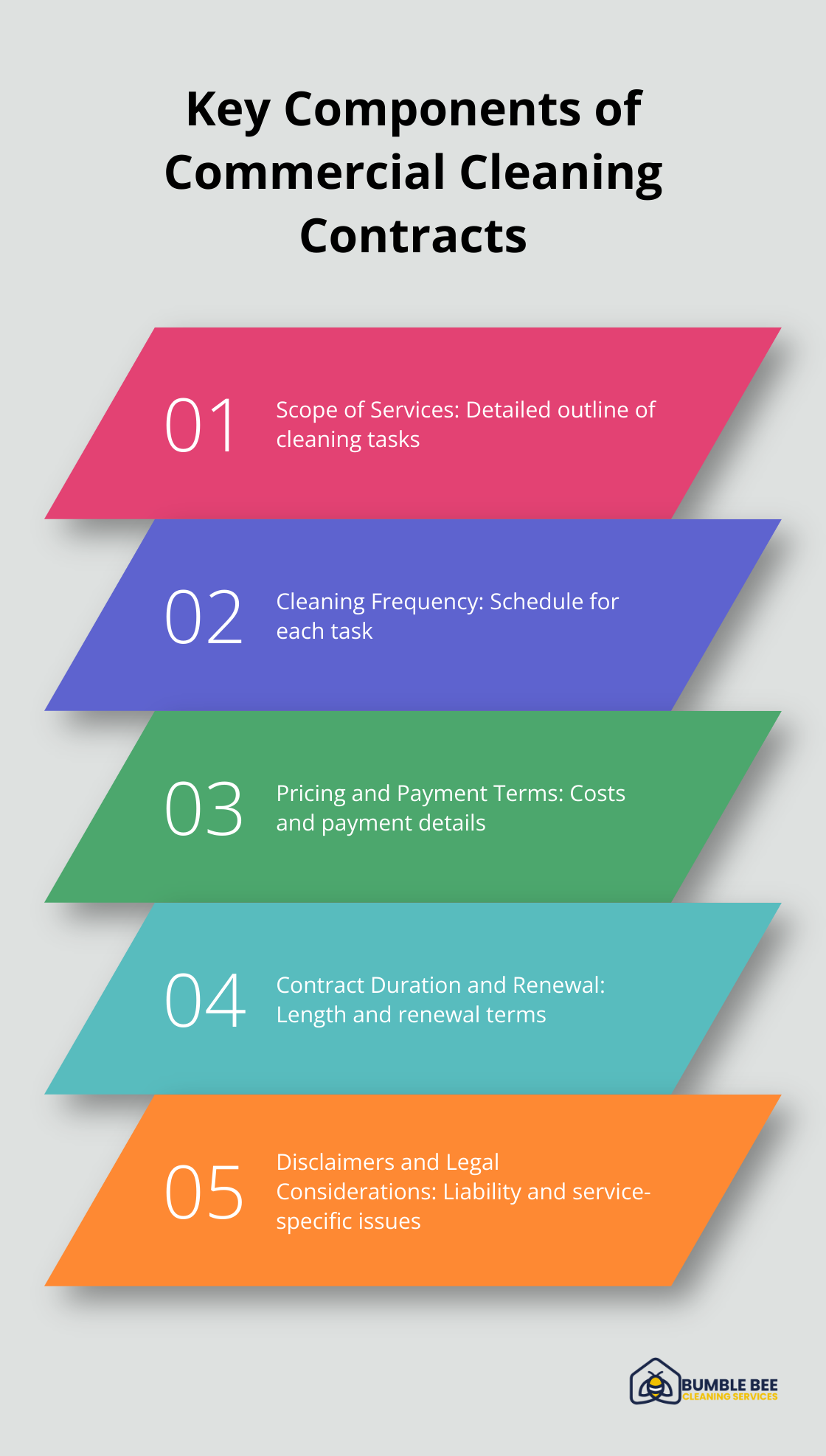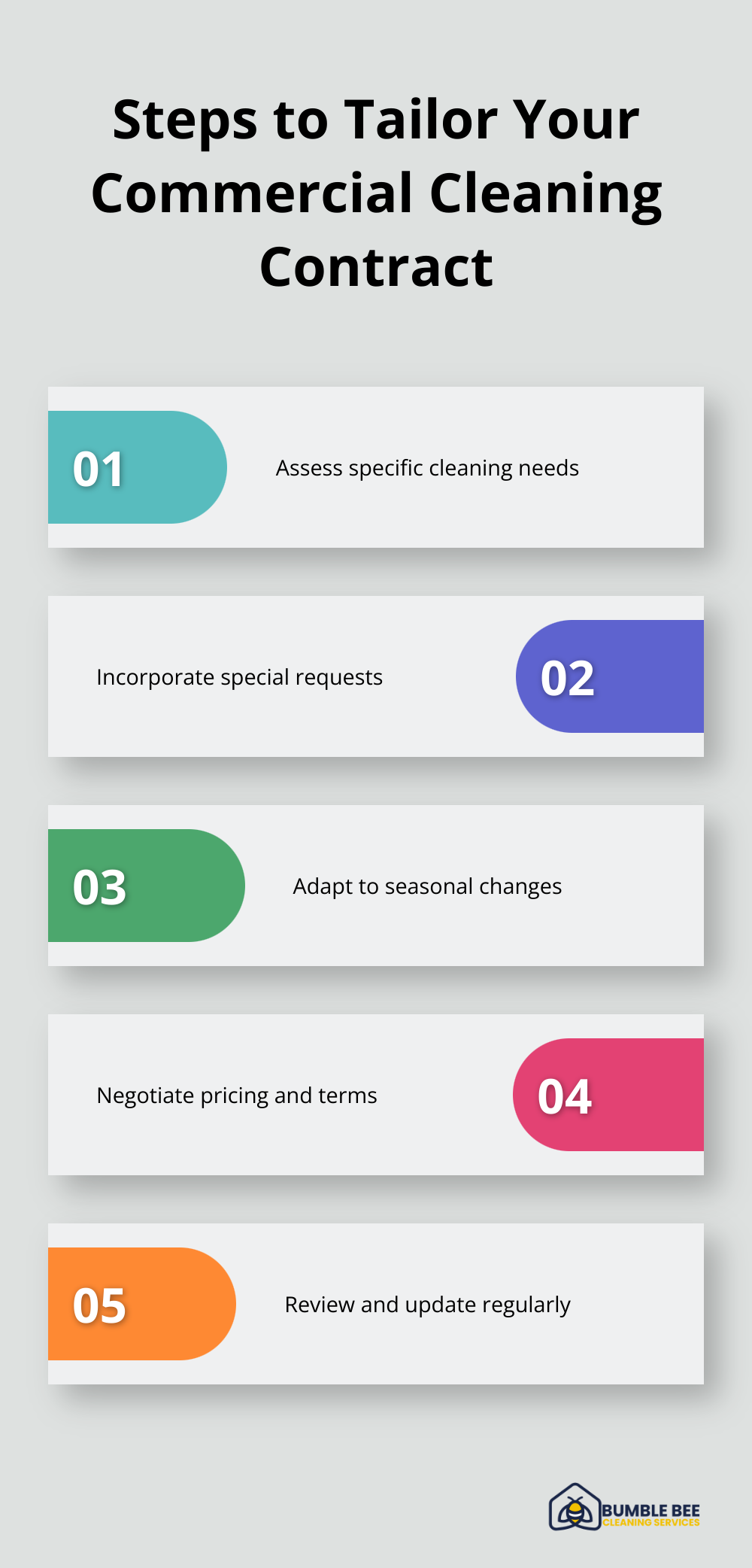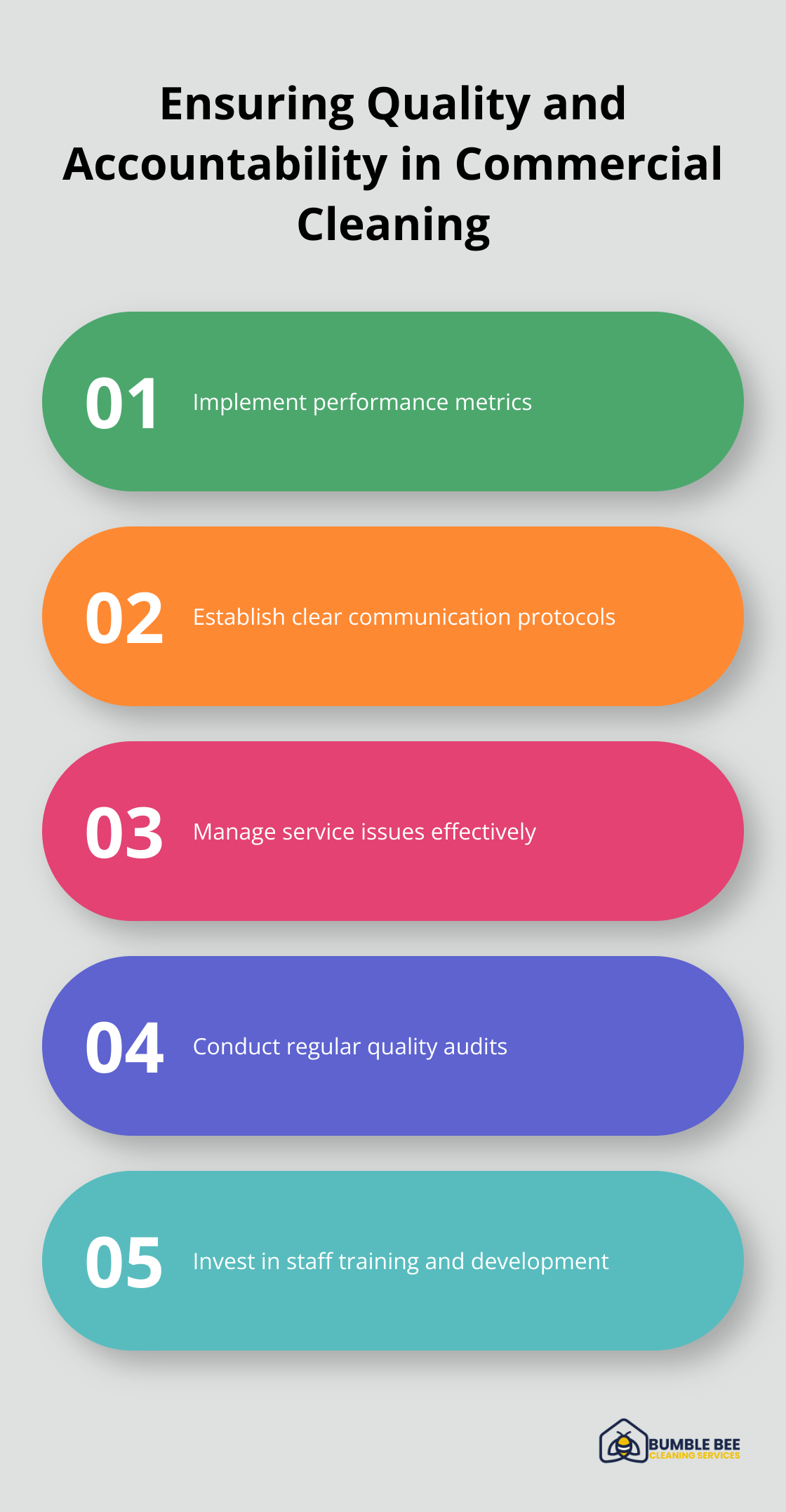Commercial cleaning contracts are essential for Seattle businesses seeking professional maintenance services. These agreements outline the expectations, responsibilities, and terms between a company and its cleaning provider.
At Bumble Bee Cleaning Services, we understand the importance of clear, comprehensive contracts that protect both parties and ensure high-quality service delivery.
This guide will help you navigate the key components of commercial cleaning agreements, customize them to your needs, and maintain accountability throughout the partnership.

What Your Commercial Cleaning Contract Should Include
Commercial cleaning contracts form the foundation of a successful partnership between businesses and cleaning service providers. A well-structured agreement leads to long-term satisfaction and cleaner workspaces.
Scope of Services: The Cornerstone of Your Contract
The first step in creating a robust cleaning contract involves a clear outline of the scope of services. This section should detail every cleaning task to be performed, from daily duties (trash removal and surface sanitization) to less frequent tasks (carpet cleaning or window washing).
Cleaning Frequency: Setting Clear Expectations
The contract must determine how often each task will be performed. Will offices receive nightly cleaning? Do restrooms require twice-daily sanitization? Is carpet shampooing a quarterly service?
Pricing and Payment Terms: Transparency is Key
The contract should outline the cost for regular services and any additional fees for special requests or emergency cleanings. The agreement should specify payment due dates and accepted methods of payment to avoid confusion.
Contract Duration and Renewal: Planning for the Future
The agreement should specify the length of the contract and renewal terms. Many Seattle businesses prefer one-year contracts with automatic renewal clauses. This approach provides stability for both parties while allowing for periodic reviews and adjustments.
A well-crafted agreement doesn’t just protect interests-it creates a foundation for exceptional service and a spotless workplace. The next section will explore how to customize your commercial cleaning agreement to meet your unique business needs.
Disclaimers and Legal Considerations
It’s crucial to include disclaimers that cover liability, service-specific issues, and legal considerations. These help set clear expectations and prevent misunderstandings between the cleaning service provider and the client.
How to Tailor Your Commercial Cleaning Contract

Assess Your Specific Cleaning Needs
The first step to customize your cleaning contract involves a thorough assessment of your facility. This requires a walkthrough of your premises to identify high-traffic areas, special surfaces, and any industry-specific cleaning requirements. A medical office, for example, will have different needs than a retail space or a corporate headquarters.
Consider factors such as your operating hours, peak business times, and any security concerns during this assessment. This information helps determine the most suitable cleaning schedule that minimizes disruption to your daily operations.
Incorporate Special Requests
After you establish the basic cleaning needs, address any special requests or additional services. A commercial cleaning contract explains the terms and provisions of cleaning services agreed upon between a cleaning company and a business or property owner. This might include tasks like more frequent sanitization of high-touch surfaces, use of specific cleaning products for sensitive equipment, or extra attention to client-facing areas.
For instance, if you run a restaurant in Seattle, you might need additional focus on kitchen hygiene and compliance with local health regulations. If you manage a tech startup, you might require specialized cleaning for electronic equipment (which often requires careful handling and specific cleaning agents).
Adapt to Seasonal Changes
Seattle’s unpredictable weather means your cleaning needs might change with the seasons. Your contract should include built-in flexibility to accommodate these changes. This could involve more frequent entryway cleaning during rainy seasons to prevent slip hazards, or additional air duct cleaning in spring to combat allergens.
Many businesses also experience seasonal fluctuations in foot traffic or workload. Your cleaning contract should adapt to these changes, allowing for increased or decreased service frequency as needed. Seattle’s cleaning techniques often prioritize the use of eco-friendly and non-toxic cleaning products, which are safer for both people and the environment.
Negotiate Pricing and Terms
When you tailor your contract, discuss pricing adjustments for any additional services or special requests. Try to negotiate terms that allow for some flexibility in service frequency or scope without incurring significant additional costs. This approach can help you manage your cleaning budget more effectively while still maintaining a high standard of cleanliness.
Review and Update Regularly
A well-tailored cleaning contract isn’t set in stone. As your business evolves, so too should your cleaning needs. Schedule regular reviews (perhaps quarterly or bi-annually) to assess the effectiveness of your current contract and make any necessary adjustments. This proactive approach ensures your cleaning service continues to meet your changing needs over time.
The next step in creating an effective commercial cleaning contract involves establishing clear quality control measures and communication protocols. These elements ensure that the tailored services you’ve negotiated are consistently delivered to your satisfaction. It’s also important to include essential disclaimers in your contract to protect both your business and the cleaning service provider.
How to Ensure Quality and Accountability in Commercial Cleaning

Implement Performance Metrics
To measure cleaning quality objectively, we recommend the implementation of performance metrics. These metrics should include cleanliness scores for various areas, completion rates for scheduled tasks, and response times for special requests. For example, you could use a 1-10 scale to rate the cleanliness of restrooms, offices, and common areas after each cleaning session.
Many cleaning companies now use digital checklists and reporting tools to track these metrics. CleanLink provides insights on how commercial contract cleaners can diversify their client base and stay updated on industry news.
Establish Clear Communication Protocols
Clear communication proves vital for prompt concern addressing and maintaining positive working relationships. We suggest the setup of a dedicated communication channel (such as a specific email address or phone number) for all cleaning-related matters.
Regular check-ins also play a critical role. Schedule monthly or quarterly meetings with your cleaning service provider to discuss performance, address issues, and adjust the cleaning plan as needed. This proactive approach can prevent small problems from escalating into major concerns.
Manage Service Issues Effectively
Despite best efforts, issues may occasionally arise. A well-defined procedure for handling complaints ensures quick and effective resolution. This process should include:
- A system for reporting issues (e.g., an online form or dedicated phone line)
- A timeline for initial response (ideally within 24 hours)
- A protocol for escalating serious issues to management
- A follow-up procedure to ensure satisfactory problem resolution
Companies that address issues promptly and transparently often see higher client retention rates.
Conduct Regular Quality Audits
Regular quality audits help maintain high standards and identify areas for improvement. These audits should involve:
- Scheduled and surprise inspections
- Detailed checklists covering all aspects of the cleaning service
- Photographic evidence of completed work
- Client feedback surveys
Quality audits (conducted monthly or quarterly) provide valuable insights into the cleaning service’s performance and help identify trends or recurring issues.
Invest in Staff Training and Development
The quality of cleaning services directly relates to the skills and knowledge of the cleaning staff. Top cleaning companies invest in ongoing training programs for their employees. These programs cover:
- Proper use of cleaning equipment and products
- Safety procedures and OSHA compliance
- Customer service skills
- Specialized cleaning techniques for different industries
Staff who receive regular training tend to perform better and show higher job satisfaction, which translates to better service quality for clients.
Key performance indicators (KPIs) and other metrics can help track overall team performance and show you where areas of opportunity lie in commercial cleaning.
Final Thoughts
Commercial cleaning contracts form the foundation of successful partnerships between Seattle businesses and their cleaning service providers. These agreements establish clear expectations, protect interests, and ensure consistent, high-quality cleaning services. Professional cleaning services offer numerous benefits for Seattle businesses, including specialized knowledge, advanced equipment, and efficient cleaning techniques.
We at Bumble Bee Cleaning Services understand the importance of tailored, professional cleaning solutions for Seattle businesses. Our team of experts specializes in commercial cleaning services, using eco-friendly products and advanced techniques to deliver exceptional results. We offer comprehensive cleaning packages, easy online booking, and a quality service guarantee.
Seattle businesses should thoroughly assess their specific cleaning needs and clearly communicate these requirements to potential service providers. They should research and compare multiple cleaning companies, paying attention to experience, certifications, and client reviews. When negotiating the contract, all services, frequencies, and special requirements must be clearly outlined.
